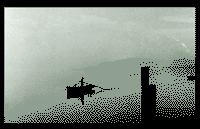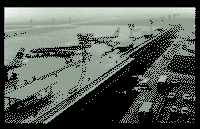June 5, 2008
Men ‘cut up like cattle’ in payback
THREE brothers and a cousin were “cut up like cattle” and four other people are missing after Papua New Guinea clansmen launched a payback attack to avenge a murder.
The four mutilated bodies were found at a settlement outside the capital Port Moresby today, police said.
Officers are searching for three women and a child, who were travelling in a ute with the slain men. It is feared they may also have been killed.
Police believe today’s killings were a payback for the murder of another man yesterday.
“This incident was particularly bad,” a police spokesman said.
“Now we are appealing for calm and no more payback.”
Police said the four men, all aged in their mid-20s, were set upon when their ute stopped at a road block at Laloki, outside Port Moresby.
Hundreds of people living in and around the Laloki area have fled their homes, fearing reprisals over the initial murder.
Payback attacks are widespread in PNG, but authorities seek to persuade aggrieved parties to settle matters through police and the court system.
Human trafficking list
Fiji and Papua New Guinea have been added to a United States blacklist of countries trafficking in people.
The Tier Three blacklist is contained in the US State Department’s annual Trafficking in Persons report.
The report analyses efforts in 170 countries to combat trafficking for forced labour, prostitution, military service and other purposes.
Pacific correspondent, Campbell Cooney, says the report claims Fiji is a source country for children trafficked for sexual exploitation, and a destination for women from China and India for forced labour and exploitation.
It also claims Papua New Guinea is the destination for women and children from Malaysia, the Philippines, Thailand, and China for sexual exploitation in cities, towns and isolated logging and mining camps.
Remaining on the Tier Three list are Sudan, Syria, Algeria, Iran, Burma and Cuba, while Malaysia and Bahrain have been removed.
In introducing the report, US Secretary of State Condoleezza Rice said human trafficking deprives people of their human rights and dignity, and “bankrolls the growth of organised crime”.
“The petty tyrants who exploit their labourers rarely receive serious punishment,” she said.
“We and our allies must remember that a robust law enforcement response is essential.”
Meanwhile, the Netherlands has allocated $US2.5 million for the elimination of child labour in Papua New Guinea.
The National newspaper reports the funding is part of a 36-month program that also covers Kiribati, Samoa, Solomon Islands and Vanuatu.
PNG acting deputy secretary for Labour and Industrial Relations, Martin Kase, says the program will help determine the extent of child labour in the country.
He says current data is inadequate.
June 4, 2008
Papua New Guinea Forests Being Cut and Burned Away
At the same time that the government of Papua New Guinea is seeking compensation for conserving the carbon-trapping capacity of its the world’s third largest expanse of tropical forests, destruction of these forests is occurring so fast that by 2021 most of the areas accessible to loggers will have been cleared or degraded, a new report based on satellite images reveals.
The images are contained in an extensive report, “The State of the Forests of Papua New Guinea,” produced by scientists at the University of Papua New Guinea Remote Sensing Centre and their colleagues at the Australian National University.
Scientists at the UPNG Remote Sensing Centre discovered that even in so-called conservation “protected areas” forest destruction is occurring at the same pace as in unprotected regions.
Where roads extend through virgin Papua New Guinea forests, loggers are on their way.
The researchers spent five years analyzing satellite images that document 30 years of destruction in an area that contains a major portion of the world’s third largest tropical forest. Only the Amazon and Congo forests are bigger.
The scientists estimate that in 2001, Papua New Guinea’s accessible forests were being cleared or degraded at a rate of 362,000 hectares a year – amounting to a combined annual rate of deforestation and degradation of 1.41 percent.
At that pace, by 2021, the authors estimate that 83 percent of the country’s accessible forest – and 53 percent of its total forested area – will be gone or severely damaged.
The forests are under pressure from industrial logging, agricultural expansion and forest fires, the satellite images show.
“Government officials may claim that they wish rich countries to pay them for conserving their forests, but if they are allowing multinational timber companies to take everything that’s accessible, all that will be left will be lands that are physically inaccessible to exploitation and would never have been logged anyway” said Phil Shearman, the report’s lead author and Director of the UPNG Remote Sensing Centre.
“It’s fair to wonder why the government should be compensated after encouraging this industry for so long in the past, or why they should get paid in the future to conserve forest that cannot be reached,” Shearman said.
The report concludes that the data on forest destruction justifies curtailing current logging industry activities and scrapping new large-scale projects.
It also calls for the government and international development partners to reorient conservation and commercial forestry activities so that they respect the rights of local communities that legally own the forest, and enable members of those communities to better use and conserve the forest for their own development needs.
“The unfortunate reality is that forests in Papua New Guinea are being logged repeatedly and wastefully with little regard for the environmental consequences and with at least the passive complicity of government authorities,” Shearman said.
Dr. Julian Ash from the Australian National University said that “by providing an objective, realistic picture of what is actually taking place, the study can offer an opportunity to institute genuine and verifiable programs that will lead to real conservation, sustainable forestry and meaningful participation in carbon trading markets.”
In order to avoid further damage, Shearman and his colleagues say that any new forestry programs should involve small and medium-scale, locally-owned and managed operations where commercial activities are more likely to be environmentally sustainable and the benefits are more likely to flow to forest communities.
“Papua New Guinea is still one of the most heavily forested countries in the world,” Shearman said. “For the first time, we have evidence of what’s happening in the PNG forests. The government could make a significant contribution to global efforts to combat climate change. It is in its own interest to do so, as this nation is particularly susceptible to negative effects due to loss of the forest cover.”
June 3, 2008
US Using Prison Ships for Torture of Suspects
The US has been operating “floating prisons” for the detention of suspects held without trial in the so called “war on terror” in order to conceal their numbers and locations. An analysis of the operation of prison ships, set to be published this year by the human rights organization Reprieve, has been compiled from the statements of the US military, the Council of Europe and related parliamentary bodies, and the testimonies of prisoners themselves.
The Reprieve study includes the account of a prisoner released from Guantánamo Bay, who described a fellow inmate’s story of detention on an amphibious assault ship. “One of my fellow prisoners in Guantánamo was at sea on an American ship with about 50 others before coming to Guantánamo … he was in the cage next to me. He told me that there were about 50 other people on the ship. They were all closed off in the bottom of the ship. The prisoner commented to me that it was like something you see on TV. The people held on the ship were beaten even more severely than in Guantánamo.”
Clive Stafford Smith, Reprieve’s legal director, said: “They choose ships to try to keep their misconduct as far as possible from the prying eyes of the media and lawyers. We will eventually reunite these ghost prisoners with their legal rights. By its own admission, the US government is currently detaining at least 26,000 people without trial in secret prisons, and information suggests up to 80,000 have been ‘through the system’ since 2001. The US government must show a commitment to rights and basic humanity by immediately revealing who these people are, where they are, and what has been done to them.”
Reprieve says that the US may have used up to 17 ships since 2001. The report also claims there have been more than 200 new cases of rendition since President George Bush declared in 2006 that the practice had stopped.
June 2, 2008
Nicaraguans launch anti-hunger march
World Food Program (WFP) summons an anti-hunger demonstration in Nicaragua to bring greater attention to the issue in this Latin nation.
Held in the northeastern city of Matagalpa Sunday, the demonstration was attended by senior government officials including ministers of agriculture, education, health and foreign affairs, local media reported, according to Xinhua.
More than 1,000 children from Matagalpa, one of the departments hardest hit by hunger and high rates of chronic bad nutrition, also participated in the march.
Agriculture Minister Ariel Bucardo vowed to push forward the program “Zero Hunger,” a government-sponsored program which aims at aiding close to 75,000 poor families to overcome poverty by providing livestock like pigs or production subsidies.
The World Food Program (WFP) initiated more anti-hunger demonstrations in 70 other cities around the world.
Expressing support for the rally, president of the WFP’s Nicaragua branch William Hart said that it could help the country on its way to eliminate hunger.
WFP Nicaragua is helping feed more than half million people in the country, including 400,000 elementary school students in Matagalpa.
About 6 million children die each year from bad nutrition in the world, while 840 million people are struggling with hunger, according to the WFP.





